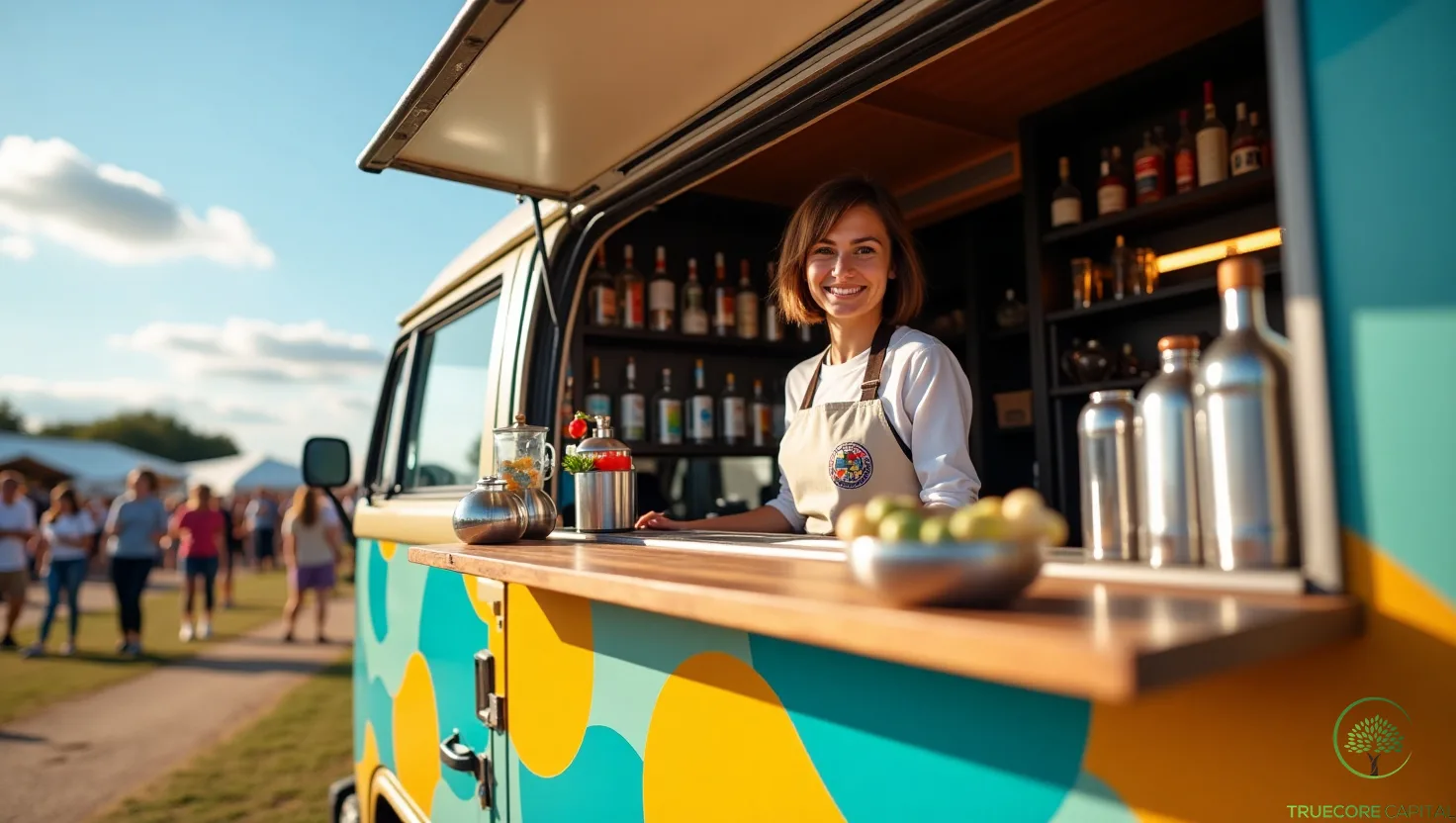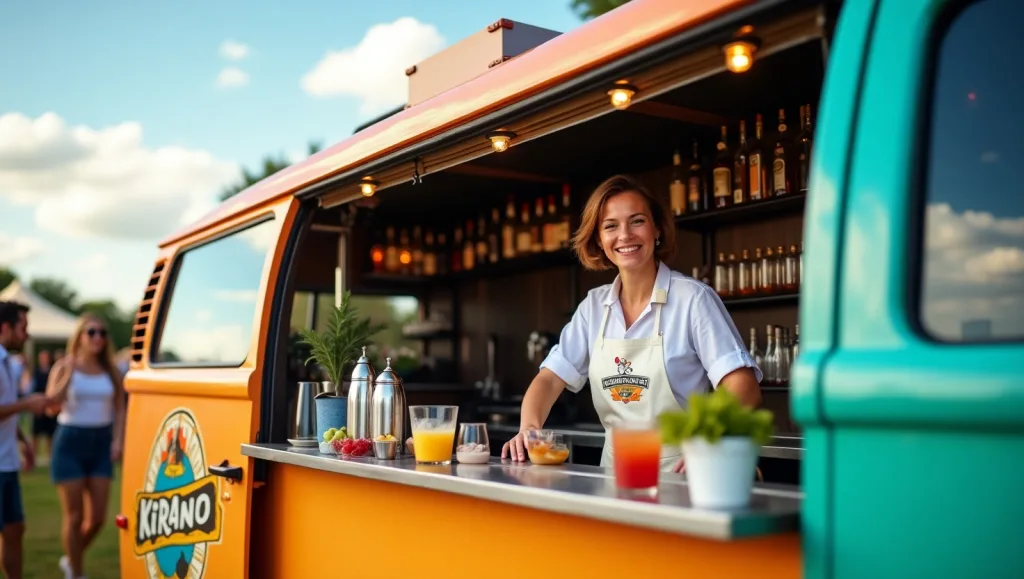
Mobile bars have grown to be a very popular service in today’s event-driven culture, where consumers are looking for unique and customized experiences. These mobile units offer convenience, entertainment, and charm all in one package, bringing the bar right to the party—from classy weddings and vibrant festivals to business meetings and private festivities. They are a unique substitute for conventional brick-and-mortar bars because of their versatility in accommodating a variety of themes and settings, particularly for events held in unconventional settings like barns, outdoor areas, or private residences.
Converting a commercial van into a mobile bar store is one of the most versatile and aesthetically pleasing mobile bar configurations. A unique bar layout, replete with refrigerators, sinks, storage, and service counters, can be created out of these trucks. The vehicle itself becomes a component of the event’s image, whether you opt for a sleek modern design to appeal to a modern audience or a vintage-style van to inspire nostalgia. In addition to improving the visitor experience, a well-designed van acts as a mobile billboard for your company, attracting attention wherever it goes.
Careful preparation is required when launching a mobile bar in a van, including selecting the ideal vehicles, creating the interior design, securing the required permits, and developing a distinctive corporate identification. To make sure their bar functions well and draws in repeat customers, operators must also think about staffing, marketing tactics, menu development, and logistics in addition to the build. A mobile bar van may be a lucrative and interesting business venture with the correct strategy and attention to detail, and it’s ideally suited to the current need for distinctive, mobile, and experience-driven services.
1. Define Your Business Concept
Determining the kind of service you’ll provide (such as cocktails, wine, beer, or non-alcoholic beverages), your target market, and the general aesthetic and branding that will distinguish your company and direct all future decisions are crucial steps to take before investing in equipment or buying a van:
Having a strong concept helps guide every decision—from vehicle selection to marketing.
2. Choose the Right Van
Your mobile bar business is built on your commercial van, so it’s important to pick one that has enough room inside for staff and equipment, is mechanically dependable for frequent travel, and has an eye-catching exterior that complements your brand’s aesthetic and can draw attention at events:
Popular van choices include:

3. Design and Convert the Interior
Your mobile bar van’s interior design must carefully strike a balance between useful utility and a welcoming atmosphere. A carefully considered structure guarantees that bartenders can operate effectively while establishing a friendly atmosphere for visitors. A bar counter, which is frequently integrated into the side or back of the van, refrigeration units or coolers to keep drinks cold, a sink with a clean water tank and greywater system for hygienic purposes, and a dependable power source, such as a generator, solar panels, or batteries, to run appliances and lights are all considered essential components.
Along with the essential functions, careful storage options are essential for maintaining supplies, mixers, glassware, and utensils secure and organized while in transit. In order to improve the van’s aesthetic appeal and convey the character of the company, many operators additionally add branded signage, ornamental finishes, and unique lighting. The objective is to produce a unified and effective area that not only facilitates seamless operations but also improves the entire visitor experience, whether you’re doing it yourself or hiring a professional:
Work with a professional fabricator or DIY the build using online tutorials and mobile bar kits.
4. Ensure Legal Compliance
To operate lawfully and safely, your mobile bar must abide by a number of rules, such as obtaining the required business licenses, obtaining the required alcohol permits (which differ by state or locality), and fulfilling health and safety requirements for waste disposal, food handling, and sanitation. Furthermore, you may want specific coverage for mobile food or beverage services, and your van needs to be appropriately registered and insured as a commercial vehicle. Before starting your business, you can make sure you meet all legal requirements by speaking with local authorities or a legal expert:
It’s wise to consult a legal professional to navigate your local laws.
5. Equip and Stock Your Bar
Outfit your bar with:
Also, consider offering customizable packages—signature cocktails, mocktail options, or drink flights—to stand out.
6. Branding and Marketing
Your van is a rolling billboard. Design it with eye-catching visuals, your logo, and contact details. Additional marketing strategies include:
Professional photos and client testimonials will help build trust and showcase your style.
7. Plan Your Operations
A successful event depends on seamless operations, so every aspect must be carefully planned. This includes hiring knowledgeable, affable staff, developing a simple and straightforward drink menu, organizing logistics like parking, power sources, and travel routes, and being ready for unforeseen circumstances like bad weather or space constraints. A tidy and expert setup is also influenced by efficient waste management, which includes the use of compostable cups and a well-defined trash disposal strategy. To ensure flawless service on the day of each event, test events can be run in advance to help find and fix any problems:
Run test events with friends and family to work out any kinks.
8. Scale and Evolve
Adding more vans or trailers to serve more events, adding new services like coffee or mocktail bars, selling branded merchandise or cocktail kits, and collaborating with event planners or venues to get repeat business are all ways to grow your business once your mobile bar is operational. Additionally, you may look into renting out pop-up bar sets for indoor events or expanding your product line with themed packages. You may effectively grow and change your firm by remaining receptive to consumer input and market trends:
Pay attention to client feedback and stay ahead of industry trends.
For any mobile bar event to be successful, seamless operations are essential. Every element of your setup, from customer service and logistics planning to staff collaboration and menu execution, should be planned for efficiency. Employing skilled bartenders who can manage busy service and interact with customers results in a refined and expert experience. Service is streamlined and waste is reduced by creating a well-prepared, manageable drink menu, especially one that is customized for the occasion or time of year.
The operation of your bar depends heavily on operational issues such as organizing travel routes, obtaining sufficient parking, guaranteeing power or backup generators, and taking weather conditions into consideration. Furthermore, waste management is sometimes disregarded despite its importance; using compostable cups and having obvious trash and recycling procedures maintains the area clean and consistent with eco-friendly principles. It’s a good idea to conduct test events before to your formal launch in order to spot possible problems and adjust your procedure for actual difficulties.
However, paying for all of this can be very difficult, particularly when starting or growing your company. TrueCore Capital can help in this situation. They specialize in offering small company loans to entrepreneurs in the hotel and mobile sectors. TrueCore Capital provides adaptable loan options that can assist in transforming your idea into a successful company, regardless of whether you require money for the first van purchase, build-out expenses, equipment, personnel, or operating capital for events. You can concentrate on expanding your mobile bar with consistency and confidence if you have the correct financial partner.
Ready to start your journey? Give us a call at (805) 422-7342
 or submit a quick contact form below and one of our specialists will reach out to you shortly.
or submit a quick contact form below and one of our specialists will reach out to you shortly.